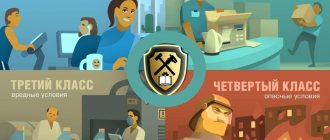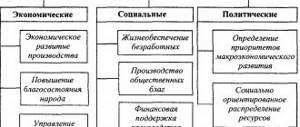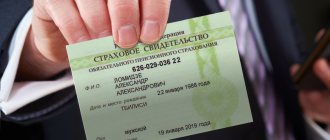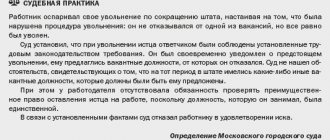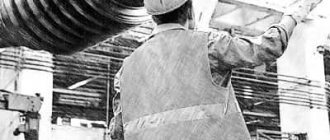Article 227 of the Labor Code of the Russian Federation. Accidents subject to investigation and recording
1. Investigation of industrial accidents is one of the main directions of state policy in the field of labor protection. The results of the investigation, drawn up in accordance with the requirements of the law, are the basis for protecting the legitimate interests of workers affected by industrial accidents, as well as members of their families on the basis of compulsory social insurance against industrial accidents and occupational diseases (see commentary to Art. 184) or in civil law at the expense of the tortfeasor.
2. Part 1 of Article 227 of the Labor Code of the Russian Federation establishes the circle of persons whose accidents are subject to investigation, including, along with employees, “other persons involved in the production activities of the employer.”
Persons participating in the production activities of the employer, part 2 of the commented article, in addition to employees performing their duties under the employment contract, include:
- employees and other persons undergoing vocational training or retraining in accordance with an apprenticeship contract;
- persons suffering from mental disorders who participate in productive work at medical and industrial enterprises in the form of occupational therapy in accordance with medical recommendations;
- persons involved in the prescribed manner to perform socially useful works;
- members of production cooperatives and members of peasant (farm) households who take personal labor participation in their activities.
In addition to this, the events specified in Part 3 of Article 227 of the Labor Code of the Russian Federation are also subject to investigation (as accidents), if they occurred with persons duly involved in the work to prevent a catastrophe, accident or other emergency circumstances or in liquidation work their consequences.
In accordance with Art. 13 of the Law on a State of Emergency, the involvement of citizens to carry out and ensure emergency rescue and other urgent work may take place in the event of a state of emergency. Guarantees of property and social rights of citizens during a state of emergency are provided for in Art. 29 of the said Law.
3. Accidents with persons working on the basis of a civil contract, as with those performing work on the instructions of an organization or an individual employer, are also subject to investigation and recording.
Article 227 of the Labor Code of the Russian Federation does not apply to individual entrepreneurs who do not employ the labor of other workers.
4. In addition to industrial accidents, investigation and recording in accordance with Art. 212 of the Labor Code are also subject to occupational diseases - chronic or acute diseases of workers that are the result of exposure to harmful production factors and resulted in temporary or permanent loss of their professional ability to work (for the procedure for investigating occupational diseases, see paragraph 7 of the commentary to Article 229).
5. Accidents at work and occupational disease are insured events that give rise to corresponding obligations of the insurer if they occur with employees subject to compulsory social insurance. For coverage in connection with industrial accidents or occupational diseases, see the commentary. to Art. 184.
6. When applying Article 227 of the Labor Code of the Russian Federation, it should be taken into account that employees are obliged to immediately notify their immediate or superior manager about any situation that threatens the life and health of people, about every accident at work or about a deterioration in their health, incl. about the manifestation of signs of an acute occupational disease (poisoning) (Article 214 of the Labor Code of the Russian Federation).
General points
According to the Labor Code of the Russian Federation and the regulations on the specifics of investigating industrial accidents in certain industries and organizations, it is necessary to investigate industrial accidents. These legal acts establish the procedure for investigating and recording ERP in production. It is undoubtedly mandatory for all organizations, regardless of their organizational and legal form, as well as for persons engaged in entrepreneurial activities without forming a legal entity and using hired labor.
Cases related to many factors are subject to investigation. If you participate in the employer’s production activities, as well as when carrying out other lawful actions determined by the employment relationship with the employer or performed in his interests.
Consequences to be considered
As a result, the employee may become unable to work.
The board for the investigation of emergency incidents at the enterprise, in accordance with the regulations established by law, examines the following incidents due to which the following events and injuries occurred to the victims:
- Injury to the body, including self-mutilation caused by another person;
- Overheating of the body, with prolonged exposure to high ambient temperatures, both with and without burns;
- Hypothermia of the body, with prolonged exposure to low ambient temperatures, resulting in frostbite;
- Exposure to the body by liquid, including death from liquid penetration into the lungs;
- Damage to organs and tissues by a discharge of any type of electricity, including natural, by any type of radiation that occurred in a given workplace;
- Attacks by animals or invertebrate arthropods causing injury to an employee;
- Violation of the anatomical integrity or functional tissue of an organ, part of the body or the entire body of an employee due to detonations, destruction of houses, natural disasters;
- Bodily injuries not included in the above list.
If all of the above causes of bodily injury to an employee, caused by the negative action of an external force, provoked the reassignment of the employee to another position, short-term or permanent loss of performance, or the death of the injured person, then these reasons are subject to strict investigation and subsequent registration by the industrial accident inspectorate.
UrDela.ru
Accidents that occur with employees and other persons involved in the employer’s production activities (including persons subject to compulsory social insurance against industrial accidents and occupational diseases) while performing their job duties are subject to investigation and recording in accordance with this chapter. or performing any work on behalf of the employer (his representative), as well as when carrying out other lawful actions determined by the labor relationship with the employer or performed in his interests.
Persons participating in the employer’s production activities, in addition to employees performing their duties under an employment contract, in particular include:
employees and other persons undergoing vocational training or retraining in accordance with an apprenticeship contract;
students and students of educational institutions of all types undergoing practical training;
persons suffering from mental disorders who participate in productive work at medical and industrial enterprises in the form of occupational therapy in accordance with medical recommendations;
persons sentenced to imprisonment and forced to work;
persons involved in the prescribed manner to perform socially useful works;
members of production cooperatives and members of peasant (farm) households who take personal labor participation in their activities.
Events as a result of which the victims received: bodily injuries (injuries), including those inflicted by another person, are subject to investigation in the established manner as accidents; heatstroke; burn; frostbite; drowning; electric shock, lightning, radiation; bites and other bodily injuries caused by animals and insects; damage due to explosions, accidents, destruction of buildings, structures and structures, natural disasters and other emergency circumstances, other health damage caused by external factors, resulting in the need to transfer the victims to another job, temporary or permanent loss of their ability to work or death of the victims, if the following events occurred:
during working hours on the employer’s territory or in another place where work is performed, including during established breaks, as well as during the time necessary to put production tools and clothing in order, to perform other actions provided for by the internal labor regulations before and after end of work, or when performing work outside the established working hours for the employee, on weekends and non-working holidays;
when traveling to or from work in a vehicle provided by the employer (his representative), or in a personal vehicle in the case of using a personal vehicle for production (official) purposes by order of the employer (his representative) or by agreement of the parties to the employment contract ;
when traveling to and from the place of business travel, during business trips on public or official transport, as well as when following the order of the employer (his representative) to the place of work (assignment) and back, including on foot;
when traveling on a vehicle as a shift worker during a rest period between shifts (a shift driver on a vehicle, a conductor or mechanic of the refrigerated section on a train, a member of the mail car crew, and others);
when working on a rotational basis during rest between shifts, as well as when being on a ship (air, sea, river) during free time from the watch and ship work;
when carrying out other lawful actions caused by labor relations with the employer or performed in his interests, including actions aimed at preventing a disaster, accident or accident.
The events specified in part three of this article are also subject to investigation in the established manner as accidents if they occurred with persons involved in the established procedure to participate in the work to prevent a catastrophe, accident or other emergency circumstances or in the work to eliminate their consequences.
‹ Article 226 (Labor Code of the Russian Federation) Financing of measures to improve working conditions and labor protection Up Article 228 (Labor Code of the Russian Federation) Responsibilities of the employer in case of an accident ›
Article 227. “Labor Code of the Russian Federation” dated December 30, 2001 N 197-FZ (as amended on December 29, 2020)
1. One of the main directions of state policy in the field of labor protection is the investigation and recording of industrial accidents and occupational diseases (Article 210 of the Labor Code). The results of the investigation, drawn up in accordance with the requirements of the law, serve as the basis for protecting the legitimate interests of workers affected by industrial accidents, as well as members of their families on the basis of compulsory social insurance against industrial accidents and occupational diseases (see commentary to Article 184 ) or in civil law at the expense of the tortfeasor.
An industrial accident is an event as a result of which an employee or other person involved in the production activities of the employer, while performing their job duties or performing any work on behalf of the employer (his representative), as well as when carrying out other lawful actions due to labor relations with the employer or committed in his interests, received: bodily injuries (injuries); heatstroke; burn; frostbite; drowning; electric shock, lightning, radiation; bites and other bodily injuries caused by animals and insects; damage due to explosions, accidents, destruction of buildings, structures and structures, natural disasters and other emergency circumstances, other health damage caused by external factors, resulting in the need to transfer the victim to another job, temporary or permanent loss of ability to work, or his death.
2. Part 1 of the commented article defines the circle of persons whose accidents are subject to investigation and recording. Such persons include employees and other persons participating in the production activities of the employer.
Part 2 of Art. 227, persons participating in the employer’s production activities, in addition to employees performing their duties under an employment contract, include: employees and other persons receiving education in accordance with an apprenticeship contract; students undergoing practical training; persons suffering from mental disorders who participate in productive work at medical and industrial enterprises in the form of occupational therapy in accordance with medical recommendations; persons sentenced to imprisonment and forced to work; persons involved in the prescribed manner to perform socially useful works; members of production cooperatives and members of peasant (farm) households who take personal labor participation in their activities.
3. Accidents involving persons working on the basis of a civil contract, as those performing work on behalf of the employer, an individual or legal entity, are also subject to investigation and recording (Part 1, Article 227). For individual entrepreneurs who do not employ the labor of other workers, the provisions of Art. 227 do not apply.
4. In addition, as follows from Part 4 of Art. 227, the events specified in Part 3 of Art. are also subject to investigation as accidents. 227, if they occurred with persons involved in the prescribed manner in the work to prevent a catastrophe, accident or other emergency circumstances or in the work to eliminate their consequences.
When a state of emergency is introduced, in exceptional cases related to the need to carry out and ensure emergency rescue and other urgent work, the mobilization of the working population and the involvement of citizens' vehicles to carry out the specified work with mandatory compliance with labor protection requirements (clause “e” of Art. 13 of the Law on the State of Emergency). Guarantees of property and social rights of citizens and organizations during a state of emergency are provided for in Art. 29 of the said Law.
5. As can be seen from the provisions of Art. 212 of the Labor Code, in addition to industrial accidents, occupational diseases are also subject to investigation and recording - chronic or acute diseases (poisonings) of workers resulting from exposure to harmful production factors and resulting in temporary or permanent loss of their professional ability to work. The procedure for investigating and recording occupational diseases is established by the Regulations on the investigation and recording of occupational diseases, approved. Decree of the Government of the Russian Federation dated December 15, 2000 N 967.
6. Occupational accidents or occupational diseases that occur to employees subject to compulsory social insurance against industrial accidents and occupational diseases are insured events that give rise to corresponding obligations of the insurer.
Issues regarding recognition of an accident as an insured event are complex and often become the subject of consideration by higher courts. Thus, the Presidium of the Supreme Arbitration Court of the Russian Federation, canceling the decision of the Moscow Arbitration Court dated October 26, 2009, the Resolution of the Ninth Arbitration Court of Appeal dated January 25, 2010 and the Resolution of the Federal Arbitration Court of the Moscow District dated April 30, 2010 in the case on the application of the Central Bank of the Russian Federation represented by the Central Vault of the Bank Russia on recognizing as illegal the actions of the State institution - the Moscow regional branch of the Social Insurance Fund of the Russian Federation for not recognizing as an insured event an industrial accident that occurred with the employee Knyazev I.S., pointed out that when considering this case for qualifying an industrial accident as an insured all that matters is that the event as a result of which the insured suffered damage to health occurred during working hours and in connection with the performance by the insured of actions determined by the employment relationship with the employer or performed in his interests. The establishment of other circumstances for recognition of such a case by the insurance legislation of the Russian Federation is not provided for (see Resolution of the Presidium of the Supreme Arbitration Court of the Russian Federation dated December 28, 2010 N 11775/10 in case N A40-101647/09-119-757).
7. For coverage in connection with industrial accidents or occupational diseases, see the commentary. to Art. 184.
In accordance with Art. 214 of the Labor Code, an employee is obliged to immediately notify his immediate or superior manager about any situation that threatens the life and health of people, about every accident that occurs at work, or about a deterioration in his health, incl. about the manifestation of signs of acute occupational disease (poisoning).
ORLOVSKY Y.P., CHIKANOVA L.A., NURTDINOVA A.F., KORSHUNOVA T.YU., SEREGINA L.V., GAVRILINA A.K., BOCHARNIKOVA M.A., VINOGRADOVA Z.D.
Rep. ed. Yu.P. Orlovsky “COMMENTARY ON THE LABOR CODE OF THE RUSSIAN FEDERATION”, 6th ed.
year 2014
What is subject to investigation?
From the point of view of legislation, events that occurred during the journey to the place of work, in the process of work and on the way home are subject to investigation. As a result of such events, significant negative consequences for the employee’s health should occur, including loss of productivity and death. If the event results in minor health consequences and does not affect performance, no investigation is carried out. Cases under investigation include:
- Injury;
- Poisoning;
- Frostbite;
- Burn;
- Drowning;
- Electric shock;
- Illnesses arising due to occupational activities.
Injuries will also include injuries inflicted by one employee on another, or those resulting from equipment failure. An employee is obliged to inform the employer about an accident that has occurred to him, including in the case of poisoning or illness. If the employee is unable to notify the administration himself, then his colleagues must do this. After a tragic event, an investigation is carried out in accordance with the established procedure, the results of which are recorded in standardized forms.
Employer's procedure
Step 1. Provide assistance to the victim
The head of the enterprise or his deputy must provide first aid to the victim and organize his transportation to the hospital.
In order to later investigate the circumstances, it is necessary to maintain the situation at the scene of the emergency, if this does not endanger other employees.
The employer must notify the authorities, the trade union, and the Social Insurance Fund within 24 hours about a mass accident. Below we will tell you in more detail.
Step 2. Form a commission
The employer forms a commission that will interview the victim and/or witnesses. It should include:
- occupational safety specialist;
- employer representative;
- representatives of a trade union or other elected body.
If several people were injured or someone died, the commission includes a GIT inspector, representatives of local governments and the territorial association of trade union organizations.
The victim himself also has the right to participate in the investigation of the accident as part of the commission (Article 229 of the Labor Code of the Russian Federation).
Step 3. Conduct an investigation and leave a report
The commission analyzes the circumstances of the incident, draws up protocols for examining the scene of the incident, interviewing the victim and witnesses, studying medical documents and drawing up an act in form N-1 (Resolution of the Ministry of Labor dated October 24, 2002 No. 73).
Three days were allotted for the investigation. If several people were injured or the victim died, the commission has 15 days to study what happened and draw up a report.
The commission members include in the act:
- information about the victim;
- information about the employer;
- information about the circumstances of the accident (date, time, place, type of incident, extract from the medical report, etc.);
- the causes of the work injury, including information about which safety instructions were violated;
- the degree of guilt of the injured employee;
- results of interviews with witnesses to the accident, etc.
The act is drawn up in two copies, the members of the commission sign each of them. Then information about the accident is entered into the register of industrial injuries (approved by Resolution of the Ministry of Labor dated October 24, 2002 No. 73).
Step 4: Submit Accident Reports
If as a result of an accident several people were injured or an employee died from his injuries, the employer is obliged to notify within 24 hours:
- territorial branch of GIT;
- the prosecutor's office;
- territorial branch of the FSS;
- industry department.
The notification form is approved by Resolution of the Ministry of Labor of the Russian Federation No. 73.
In order for the victim to receive compensation and benefits provided for by law, the organization sends to the Social Insurance Fund:
- notification of an insured event;
- a copy of the order to investigate an industrial accident (on the creation of a commission to investigate an industrial accident);
- a copy of the act in form N-1 - sent within three days after approval by the employer;
- a copy of the crime scene inspection report with a diagram of the crime scene;
- a copy of the victim interview protocol;
- a copy of the protocols of interviews with eyewitnesses of the accident (for each individual);
- a copy of the minutes of interviews with officials (for each separately);
- a copy of the medical report on the nature and severity of the injuries received (form 315/у);
- a copy of the employment contract or copies of the sheets of the victim’s work book;
- a copy of the SNILS insurance certificate;
- a message about the consequences of the accident and the measures taken - drawn up upon completion of treatment of the victim and presented together with a copy of certificate 316/у;
- a certificate of the final diagnosis of the victim of an accident at work (form 316/у).
The list is published on the FSS website. The department clarifies that the volume of materials may vary, it all depends on the circumstances of the accident, the severity of the injuries received and the duration of treatment.
Comments on the article
One of the main directions of state policy in the field of labor protection is the investigation and recording of industrial accidents and occupational diseases (Article 210 of the Labor Code). The results of the investigation, drawn up in accordance with the requirements of the law, serve as a basis for the protection of the legitimate interests of workers affected by accidents at work, as well as members of their families under the compulsory social insurance against accidents at work and occupational diseases (see commentary to Article 184 ) or in civil law at the expense of the tortfeasor.
An industrial accident is an event as a result of which an employee or other person involved in the production activities of the employer, while performing their job duties or performing any work on behalf of the employer (his representative), as well as when carrying out other lawful actions due to labor relations with the employer or committed in his interests, received: bodily injuries (injuries); heatstroke; burn; frostbite; drowning; electric shock, lightning, radiation; bites and other bodily injuries caused by animals and insects; damage due to explosions, accidents, destruction of buildings, structures and structures, natural disasters and other emergency circumstances, other health damage caused by external factors, resulting in the need to transfer the victim to another job, temporary or permanent loss of ability to work, or his death.
Part 1 of the commented article defines the circle of persons whose accidents are subject to investigation and recording. Such persons include employees and other persons participating in the production activities of the employer.
Part 2 of Art. 227, persons participating in the employer’s production activities, in addition to employees performing their duties under an employment contract, include: employees and other persons receiving education in accordance with an apprenticeship contract; trainees undergoing practical training; persons suffering from mental disorders who participate in productive work at medical and industrial enterprises in the form of occupational therapy in accordance with medical recommendations; persons sentenced to imprisonment and forced to work; persons involved in the prescribed manner to perform socially useful works; members of production cooperatives and members of peasant (farm) households, taking personal labor participation in their activities.
Accidents involving persons working under a civil contract are also subject to investigation and recording, as those performing work on behalf of the employer, an individual or legal entity (Part 1, Article 227). For individual entrepreneurs who do not employ the labor of other workers, the provisions of Art. 227 do not apply.
In addition, as follows from Part 4 of Art. 227, the events specified in Part 3 of Art. are also subject to investigation as accidents. 227, if they occurred with persons involved in the prescribed manner in the work to prevent a catastrophe, accident or other emergency circumstances or in the work to eliminate their consequences.
When a state of emergency is introduced, in exceptional cases related to the need to carry out and ensure emergency rescue and other urgent work, the mobilization of the working population and the involvement of citizens' vehicles to carry out the specified work with mandatory compliance with labor protection requirements (clause “e” of Art. . Law on State of Emergency). Guarantees of property and social rights of citizens and organizations during a state of emergency are provided for in Art. of the said Law.
As can be seen from the provisions of Art. 212 of the Labor Code, in addition to industrial accidents, occupational diseases are also subject to investigation and recording - chronic or acute diseases (poisonings) of workers resulting from exposure to harmful production factors and resulting in temporary or permanent loss of their professional ability to work. The procedure for investigating and recording occupational diseases is established by the Regulations on the investigation and recording of occupational diseases, approved. Decree of the Government of the Russian Federation dated December 15, 2000 N 967.
Occupational accidents or occupational diseases that occur to employees who are subject to compulsory social insurance against industrial accidents and occupational diseases are insured events that give rise to corresponding obligations of the insurer.
Issues regarding recognition of an accident as an insured event are complex and often become the subject of consideration by higher courts. Thus, the Presidium of the Supreme Arbitration Court of the Russian Federation, canceling the decision of the Moscow Arbitration Court dated October 26, 2009, the Resolution of the Ninth Arbitration Court of Appeal dated January 25, 2010 and the Resolution of the Federal Arbitration Court of the Moscow District dated April 30, 2010 in the case on the application of the Central Bank of the Russian Federation represented by the Central Vault of the Bank Russia on recognizing as illegal the actions of the State institution - the Moscow regional branch of the Social Insurance Fund of the Russian Federation for not recognizing as an insured event an industrial accident that occurred with the employee Knyazev I.S., pointed out that when considering this case for qualifying an industrial accident as an insured all that matters is that the event as a result of which the insured suffered damage to health occurred during working hours and in connection with the performance by the insured of actions determined by the employment relationship with the employer or performed in his interests. The establishment of other circumstances for recognition of such a case by the insurance legislation of the Russian Federation is not provided for (see Resolution of the Presidium of the Supreme Arbitration Court of the Russian Federation dated December 28, 2010 N 11775/10 in case N A40-101647/09-119-757).
For coverage in connection with industrial accidents or occupational diseases, see the commentary. to Art. 184.
In accordance with Art. 214 of the Labor Code, an employee is obliged to immediately notify his immediate or superior manager about any situation, threat to the life and health of people, about every accident that occurs at work, or about a deterioration in his health, incl. about the manifestation of signs of acute occupational disease (poisoning).
